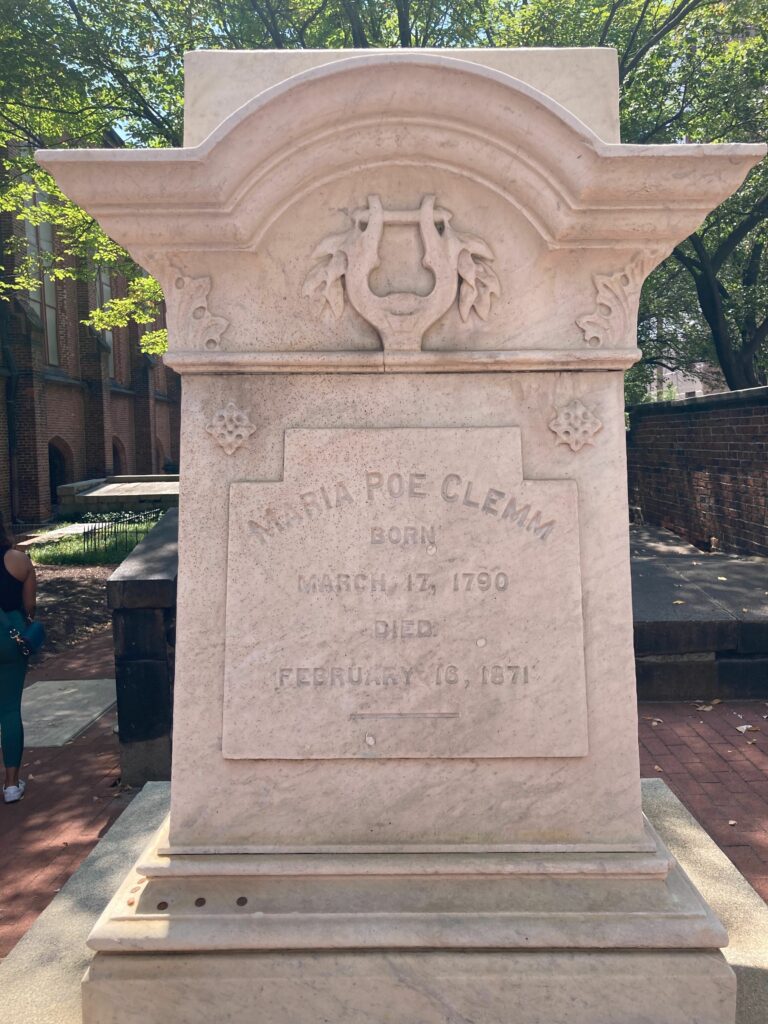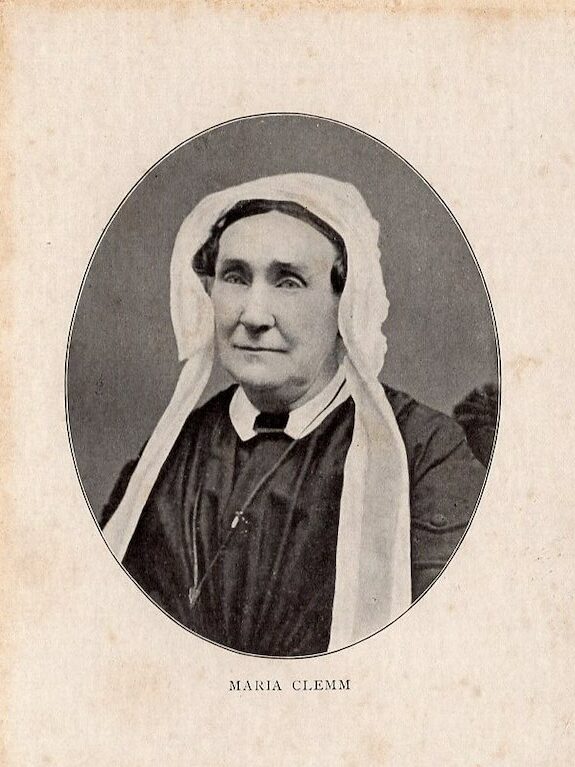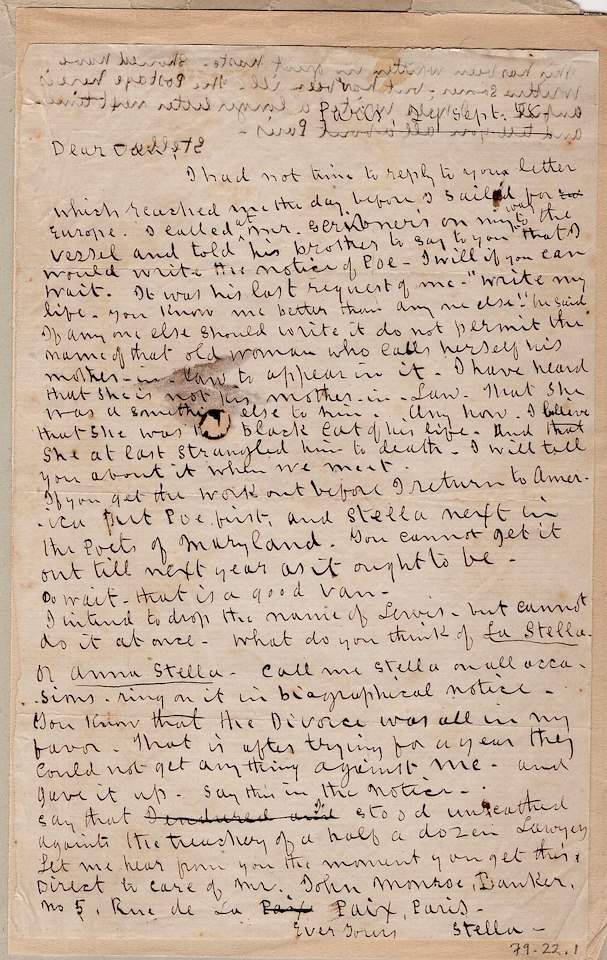Written by Sabrina Yambao, Education Intern
Maria Poe Clemm, born March 17th, 1790 in Baltimore, Maryland, was the sister of David Poe Jr. and the aunt of Edgar Allan Poe. At the age of 27, she married merchant William Clemm Jr., as his second wife. Maria became a step-mother to Clemm’s five children and the two later had three children of her own. The youngest, Virginia, married Maria’s nephew, and her cousin, Edgar Allan Poe at the age of 13.
While technically both Poe’s mother-in-law and aunt, Poe viewed Maria as a motherly figure in his life, especially as both his biological and foster mother’s had passed. She considered Poe to be her son, practically adopting him and saying that he was “indeed a son to me & has always been so” (Harrison, XVII, 380).
After moving to Richmond to work at the Southern Literary Messenger, Poe had got word that Neilson Poe, a cousin of the poet, had offered to take in the two women. Poe saw this as a threat to his family and titled Neilson as an enemy. Poe later brought Maria and Virginia to Richmond and took them into his care before and after Poe and Virginia married. The family still struggled financially, even while Poe worked at the Southern Literary Messenger.
Maria appreciated Poe’s effort in trying to keep the family together, despite the appeal of Neilson Poe’s offer and the lack of funds Poe was bringing in as the main source of income for her and her daughter. She is quoted to have said, “it takes nearly all he can make to answer that demand, but poor fellow he is willing to do all in his power for us”.
After Virginia’s death of tuberculosis, Edgar and Maria developed an almost symbiotic bond with one another, depending on each other for love and comfort. He dedicated his poem, “To My Mother” to her, stating that after Virginia died, Maria filled the void in his heart left behind by her passing. To Poe, there was no title as devoted and loving as “mother”, and she was the mother to both him and his beloved wife. In the poem, he proclaims that because she was the mother of Virginia, she was more dear to him than his birth mother was.
Because I feel that, in the Heavens above,
“To My Mother” by Edgar Allan Poe (1849)
The angels, whispering to one another,
Can find, among their burning terms of love,
None so devotional as that of “Mother,”
Therefore by that dear name I long have called you—
You who are more than mother unto me,
And fill my heart of hearts, where Death installed you
In setting my Virginia’s spirit free.
My mother—my own mother, who died early,
Was but the mother of myself; but you
Are mother to the one I loved so dearly,
And thus are dearer than the mother I knew
By that infinity with which my wife
Was dearer to my soul than its soul-life.
Poe died mysteriously and without a definitive cause as to why October 7th, 1849. A day after his funeral, she wrote to her relative Neilson Poe to confirm if Edgar was indeed dead.
“I have heard this moment of the death of my dear son Edgar—I cannot believe it, and have written to you, to try and ascertain the fact and particulars—he has been at the South for the last three months, and was on his way home—the paper states he died in Baltimore yesterday—If it is true God have mercy on me, for he was the last I had to cling to and love, will you write the instant you receive this and relieve this dreadful uncertainty—My mind is prepared to hear all—conceal nothing from me.”
Maria Poe Clemm to Neilson Poe, Fordham, New York. October 9, 1849.
Two days later, Maria received his confirmation and left her family’s cottage in Fordham to live with the Lewises’ in Brooklyn. She stayed there for roughly two weeks until moving in with Nancy “Annie” Locke Richmond, a former love interest of Poe.
Maria lived with the Richmonds for roughly a year and a half. At the beginning of her stay, she was physically sick and mourning the loss of her son. Eventually, with the kindness and the inclusiveness of the Richmonds, she became mentally and physically stable. Annie’s husband, Charles, insisted on taking her horseback riding often, and she even accompanied Annie and her young daughter on a ski trip. She received much condolences and support from Poe’s literary friends, including Charles Dickens and Henry Wadsworth Longfellow, but also witnessed and exclaimed at Poe’s rival Rufus Griswold’s defamation of Poe, who wrote in his obituary that . She wrote to Griswold and other authors that Poe was a great man, poet, and author, trying her best to keep Poe’s name good and just.
After the cold Massachusetts air set in, the sixty-one year old fled the harsh and cold conditions and lived from house to house, generosity to generosity, for roughly twelve years. In her first years of lonesome, she visited the Richmonds again, along with Poe’s old loves to seek generosity from them, including Marie Louise Shew and Sarah Helen Whitman. Whitman occasionally sent Maria money, but nothing more for fear of overstepping her own personal boundary.
Ten years after Poe’s death, Maria managed to find work and room in Alexandria, Virginia. She lived with lawyer Reuben Johnson in exchange for teaching his three children. While living here, she got severely sick, and the doctor ordered her not to use her eyes in any way. It was here on 70th birthday that she wrote, “Oh how sad and lonely I am, and with what rapture, I will hail the time when I will go to meet all my loved ones” (Maria Clemm to Sarah Helen Whitman, Alexandria, March 17, 1860).
At this time, Maria received an invitation to stay in Putnam, Ohio from the Robins family in exchange for information about Poe for Sallie E. Robins biography about him. The stay lasted two years, and it did not go as Maria had hoped. The family planned on staying in Europe for a couple years, inviting Maria along. The trip never happened, however, as Sallie was declared insane and was forced into an asylum before the trip, leaving Maria without a stable place to stay. She exclaimed that this stay was as bad as the last one, quoting, “How I wish I could get a home in some pleasant family” (Caroline Ticknor, Poe’s Helen, New York, 1916).
As the Civil War raged on, especially in Virginia, she sought refuge in Baltimore where her relative Neilson Poe lived. Originally wanting to stay at the Widows home to live out the rest of her life, she begrudgingly stayed at the Church Home after she could not afford the $150 entrance fee to the Widows home. She kept in touch with Neilson and his family, handing over control of her funeral to him. In some stroke of coincidence or perhaps planning, the Church House was actually the place where Poe died, as it had once been the Washington Medical College which treated Poe in his final days. Here, she spent her final days telling stories and details about her son-in-law and praising him till her last interview, citing him as “elegantly formed, exceedingly graceful” (Delman-Heyward Files, Maryland Historical Society).
Her final request was to be buried next to Poe, and so she was. She died February 16th, 1871, at eighty-one years old. Those who attended her funeral were admirers of Poe and her friends. She wrote to Annie prior to her death, exclaiming that she cannot wait to be with her loved ones again, telling her that the dead are with her still, and have been since they departed the living, and she will join them soon.



